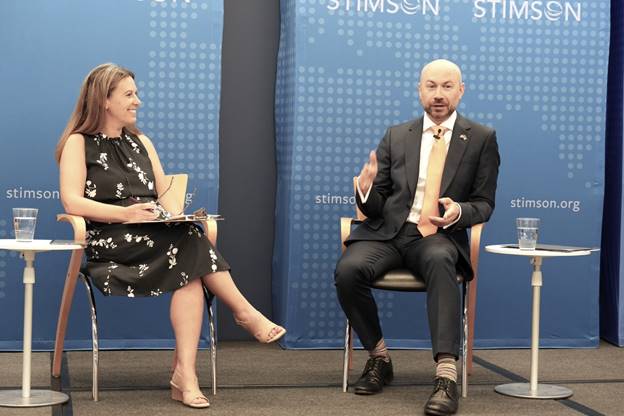
Ambassador Ursu credited as a benefit to the nation the current new generation of heads of government who have benefitted from having attended schools in the US
Moldova-US Relations, More Important than Ever
Report and photos by Phil Pasquini
Washington: With a population of 3.3 million, the landlocked Republic of Moldova bordered by Ukraine and Romania first became independent with the demise of the Soviet Union in 1991. Since that time in its formative growth, it has suffered many challenges in establishing itself as an independent democratic nation through political, ethnic, social, and economic changes.
Among its many challenges in forming a truly unified nation is the internationally unrecognized Russian separatist breakaway region of Transnistria on its eastern flank that borders Ukraine and that of Gagauzia an autonomous territory made up of four exclaves populated by a Turkic speaking ethnic group loyal to Russia along its southern border.
The Transnistria War from 1990-92 resulted in a ceasefire along with the separatist enclave declaring itself a republic. As a result, the central government centered in Chisinau has no control over Transnistria that presently houses an unknown number of Russian military troops.
In 2006, in a referendum on joining Russia held in Transnistria 95 percent of voters were in favor of doing so. Since Russia’s invasion of Ukraine in 2022, a great deal of anxiety about Putin’s intentions for the country along with the possibility of his opening a second front in the war with Ukraine have made the population uneasy as it forges ahead in its desired goal of democratization.
While the politically divided country’s pivotal and vulnerable geostrategic position makes it attractive to Russia, other parties involved in containing Putin’s expansionist intent are concerned with protecting it and all Eastern Europe from that aggression. Adding to this is the non-NATO militarily neutral country’s intent on entering the EU in 2030. While some have speculated that its entry would cause greater strife and turmoil, others believe it may in fact alleviate some of the separatist aspirations from both regions when the country becomes a part of the larger EU bloc.
With all this in mind, Moldova’s Ambassador HE Viorel Ursu spoke at the Stimson Center on July 23 on “The Future of the US-Moldova Partnership.”
Ambassador Ursu in his opening remarks described the US-Moldovan relationship as “great” by referencing a 2023 poll conducted by the International Republican Institute (IRI) in Moldova to which 76 percent of respondents said the relationship was good to very good. In contrast to Russia in which only 27 percent of respondents rated the relationship as such. While 42 percent of respondents indicated that they considered the US “the most important political partner of Moldova.”
In no small part this is due to the US having been one of the first countries to recognize Moldovan independence and soon after began assisting and funding them in the complex work involved in state building. The work in doing so evolved slower than in most other central eastern European countries because of the complexities in writing a constitution, developing a democratic framework of government, economic reforms and all other matters involved in creating a new nation state.
One of the challenges for the fledgling country was in creating a market economy from one which had been state run. Land privatization reform alone resulted in thousands of new landowners that in turn had a major positive impact on the economy.
Ambassador Ursu also credited as a benefit to the nation the current new generation of heads of government who have benefitted from having attended schools in the US in driving the country in a different direction with a “new vision” as compared to the old Moscow-educated officials of an earlier era.
Speaking on the Transnistrian conflict, Ursu related how the US and the EU along with others, including Russia, participated as observers in the 5+2 settlement that resulted in maintaining the “sovereignty and territorial integrity of the Republic of Moldova within its internationally recognized borders” while recognizing and allowing for special status for Transnistria.
Describing Russia’s war in Ukraine as a “wakeup call,” the ambassador said that it took “a war in Ukraine for Moldovans to realize who our friends really are.” One of the effects of that war is that the country presently hosts around 120,000 Ukrainian refugees whom it supports in part through $800 million in financial assistance from the US. He went on to say that what made him most proud was that the refugees were never housed in tents but instead were welcomed by Moldovans into their own homes.
On the issue of Russian energy dependence, the ambassador related that when Russia weaponized the distribution of natural gas in 2022 by reducing supplies, Moldova like many European countries completely dependent on Russian supplies was adversely impacted. However, with the backing of the US the EU and others who contributed $300 million, they were able to find alternative sources within a few weeks.
This challenge in turn resulted in a US energy resource survey of the country that discovered one-third of its energy needs could be met through the development of domestic resources. The ambassador summed up his perspective on this as “never waste a crisis” but rather take the opportunity to meet the challenge through creative resolution.
Moldova countered by stopping all payments to Russia on outstanding debts to Gazprom to keep the funds from being used to support the war in Ukraine.
(Phil Pasquini is a freelance journalist and photographer. His reports and photographs appear in the Washington Report on Middle East Affairs, Countercurrents and Nuze.ink. He is the author of Domes, Arches and Minarets: A History of Islamic-Inspired Buildings in America.)

